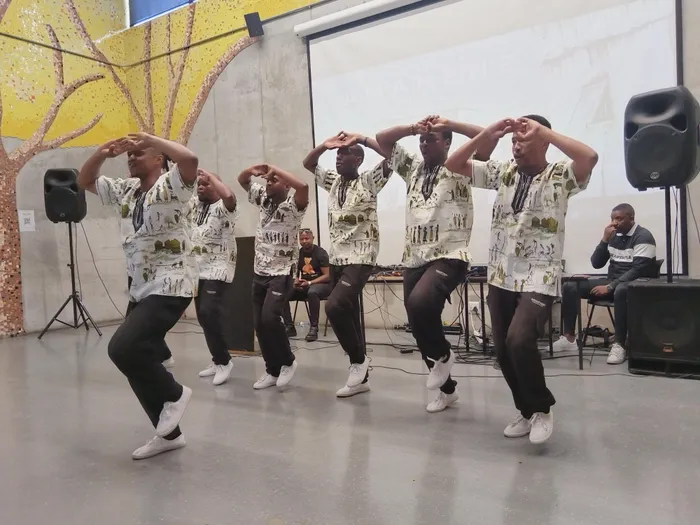Khayelitsha's Major Voices: A documentary on redemption through music

The Major Voices are the main group of acappella music in Khayelitsha.
Image: Phiri Cawe

Maggie Mercier from Canada met the group in 2018.
Image: Phiri Cawe

Major Voices affectionately called Amanene (the Gentlemen) performing before the premier of their documentary last Saturday at Isivivane.
Image: Phiri Cawe
Despite a difficult past entangled in gangs, crime, and drugs, seven young men from Khayelitsha made a life-altering decision to choose music over crime.
The group, known as Major Voices, affectionately called Amanene (the Gentlemen), is celebrated in their community for using songs to inspire hope and uplift the next generation.
These men, once feared for tormenting their neighbourhood through robberies and criminal acts, now stand as symbols of transformation. Their remarkable story has been captured in a feature-length documentary titled Amanene Beyond Voices, directed and produced by their long-time friend and collaborator, Maggie Mercier, from Canada.
The film premiered at Isivavane on Saturday, November 15.
Looking back, lead singer Ayabulela Tshabile said they were young, naïve, and driven by desperation.
“We were all out of school with no money and no jobs,” he said. “But once we realised what we were doing was wrong, we chose music. We started the group in 2012.”
Their humble beginnings included singing at taxi ranks and malls for small donations.
“We realised we could go home with something,” he said.
“We could buy bread and whatever went with it. That pushed us mentally. We grew and decided to take our music seriously.”
Their lives changed further when they met Ms Mercier at the V&A Waterfront in 2018. She was in South Africa on assignment, and their connection was instant.
“As they say, the rest was history. She is still with us even today,” Mr Tshabile said.
The group performs Afro-pop in addition to their signature harmonies.
Speaking of the documentary, Mr Tshabile said: “The film tells our stories. Maggie decided to make a 120-minute documentary, and we are grateful. To young people who may be tempted to take the path we once took, I can say, do not try it.”
Ms Mercier has spent the past eight years immersing herself in the lives of the group in Khayelitsha. What began as a professional encounter has grown into a unique friendship and creative partnership. She considers the group her family.
“I did not change their lives; they changed mine,” she said.
“I met them in 2017, and in 2018, we became very close. We’ve been helping each other ever since. They are my brothers now. They shared their stories, deep, powerful stories, and that is why I decided to make the documentary. They have so much to tell. They chose music over crime, and that choice has shaped everything.”
She described the film as an immersion into their music and their daily realities, revealing how their voices became a weapon for transformation, turning gangsters into gentlemen and paving the way for a future filled with hope and dreams.
The community gathered in large numbers to witness the premiere, becoming the first audience to experience this powerful story on screen.
Related Topics: